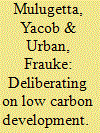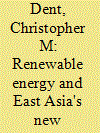|
|
|
Sort Order |
|
|
|
Items / Page
|
|
|
|
|
|
|
| Srl | Item |
| 1 |
ID:
101429


|
|
|
|
|
| Publication |
2010.
|
| Summary/Abstract |
Low carbon development (LCD) is a much used word in development circles today. As such, governments are actively exploring how to achieve their growth targets through a low carbon trajectory or even through a 'carbon neutral' pathway. This is a new area that challenges how development has been done so far, calling for not only a serious rethink of old practices but also contesting entrenched value systems. In this viewpoint, we explore some of the underlying issues that are driving the process of mainstreaming climate change in development. Recognising that there are variations in LCD, we map out the diversity of understandings and interpretations with a view to lay out the range of possibilities that countries can consider. We argue that whilst countries should certainly draw lessons from the experiences of others on mainstreaming climate change in their policies and practices, the version of LCD that each country follows needs to emerge from within its own national reality, anchored in its development prospects, aspirations and capacities.
|
|
|
|
|
|
|
|
|
|
|
|
|
|
|
|
| 2 |
ID:
113497


|
|
|
|
|
| Publication |
2012.
|
| Summary/Abstract |
Modern energy access in Africa is critical to meeting a wide range of developmental challenges including poverty reduction and the Millennium Development Goals (MDGs). Despite having a huge amount and variety of energy resources, modern energy access in the continent is abysmal, especially Sub-Saharan Africa. Only about 31% of the Sub-Saharan African population have access to electricity while traditional biomass energy accounts for over 80% of energy consumption in many Sub-Saharan African countries. With energy use per capita among the lowest in the world, there is no doubt that Africa will need to increase its energy consumption to drive economic growth and human development. Africa also faces a severe threat from global climate change with vulnerabilities in several key areas or sectors in the continent including agriculture, water supply, energy, etc. Low carbon development provides opportunities for African countries to improve and expand access to modern energy services while also building low-emission and climate-resilient economies. However, access to finance from different sources will be critical in achieving these objectives. This paper sets out to explore the financial instruments available for low carbon energy access in Africa including the opportunities, markets and risks in low carbon energy investments in the continent.
|
|
|
|
|
|
|
|
|
|
|
|
|
|
|
|
| 3 |
ID:
118574


|
|
|
|
|
| Publication |
2012.
|
| Summary/Abstract |
East Asia's renewable energy (RE) sector has grown faster than any other region's since the mid-2000s. It is argued that renewables formed an integral part of the region's new industrial policies and new developmentalism, which are founded on new configured forms of state capacity shaped in response to various challenges, primarily climate change, energy security, globalisation and global neo-liberalism. By studying the recent progress of East Asia's RE sector, we gain useful insights into these key developments in East Asia's political economy and the region's prospects for transition towards low carbon development. This analysis considers how and why different approaches to RE policy emerged in East Asia, to what extent the promotion and expansion of East Asia's RE sector is part of a new industrial policy paradigm and new developmentalism, and what the study of East Asian policies on promoting renewable energy can tell us about the region's broader approach to low carbon development. Although the promotion of renewable energy has been a fundamental part of East Asia's recent macro-development plans and new developmentalism generally, these same plans suggest that East Asian states will simultaneously continue to significantly promote high carbon and ecologically damaging industrial activities, thus undermining the low carbon credentials of East Asia's new developmentalism. The path to meaningful low carbon development will be very long and will take many decades to achieve. However, it is contended that by maintaining and improving their various forms of state capacity over time, the East Asian states will be well positioned to sustain the significant growth of their renewable energy sectors and thereby further strengthen the low carbon development orientation of their new industrial policies, macro-development plans and strategic economic thinking.
|
|
|
|
|
|
|
|
|
|
|
|
|
|
|
|
|
|
|
|
|